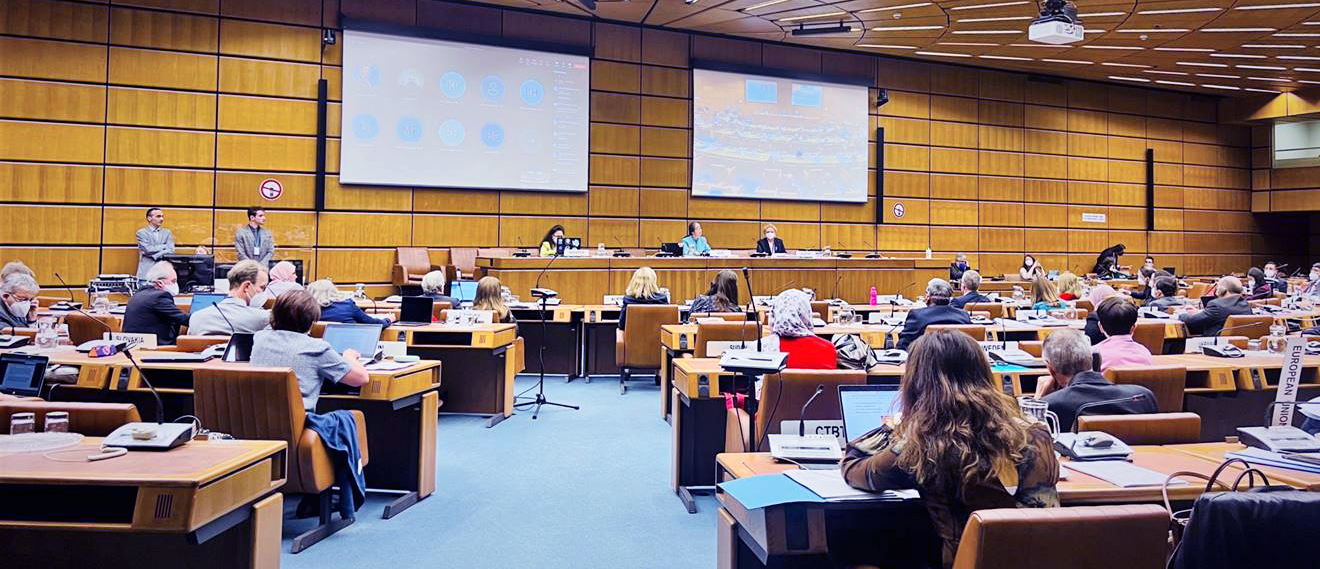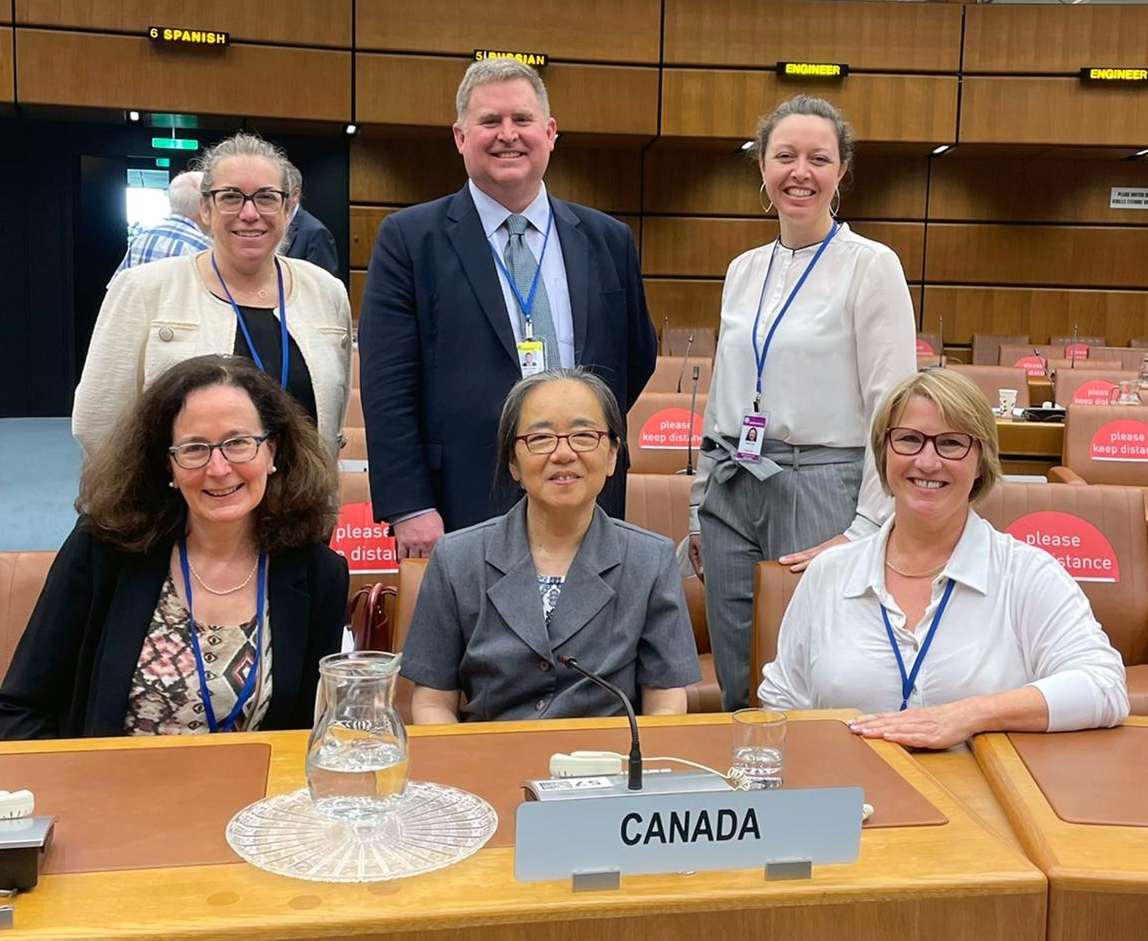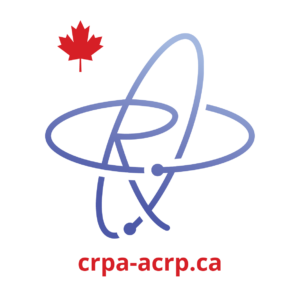Rapport de la 69e session du Comité scientifique des Nations Unies pour l’étude des effets des rayonnements ionisants (UNSCEAR)

La 69e session de l’UNSCEAR en cours.
The mandate of the United Nations Scientific Committee on the Effects of Atomic Radiation’s (UNSCEAR) is to assess and report levels and effects of exposure to ionizing radiation. It is the world authority on radiation science and the estimation of global levels and effects of ionizing radiation that serves as the scientific basis for evaluating radiation risk and for establishing protective measures.
For the first time since before the global pandemic, the annual session of UNSCEAR took place in person in Vienna, Austria. The session was held as a hybrid meeting from May 9 to 13, 2022.

Photo de groupe des participants à la 69e session de l’UNSCEAR.
During the session, UNSCEAR acknowledged the work of the bureau for the 66th to 68th sessions led by Gillian Hirth (Australia) and the contribution of the outgoing vice-chair, Jin Kyung Lee (Republic of Korea), and elected the bureau for the 69th and 70th sessions:
- Chair: Jing Chen (Health Canada)
- Vice-chairs: Lidia Vasconcellos de Sá (Brazil), Anssi Auvinen (Finland), and Anna Friedl (Germany)
- Rapporteur: Sarah Baatout (Belgium)
The 69th session was chaired by Dr. Jing Chen, who will also chair the 70th session in 2023. Congratulations, Jing, on this prestigious appointment!
Jing highlighted the significant progress made by the committee since the 68th session, including the publication of Annexes A, B, and C of the UNSCEAR 2020/2021 Report. She also endorsed the new strategy for data collection, analysis, and dissemination to support the committee’s future evaluations on medical, occupational, and public exposures. The strategy aims to
- seek widespread participation in the committee’s surveys;
- improve regional representation in future reports on medical, occupational and public exposures to ionizing radiation; and
- ensure future committee surveys are relevant and useful, and adapt to changing data sources and uses of radiation across the world.
During the 69th session, more than 180 scientists from 31 member states and 13 international organizations also advanced their ongoing work on
- second primary cancer after radiotherapy,
- epidemiological studies of radiation and cancer,
- diseases of the circulatory system from radiation exposure, and
- evaluation of public exposure to ionizing radiation from natural and other sources.
New evaluations and the committee’s future program of work (2025 to 2029) were also a key part of the discussions.
In the margins of the 69th session, the director general of the International Atomic Energy Agency (IAEA), Rafael Grossi, and UNSCEAR representive Batandjieva-Metcalf, committee secretary, signed the first memorandum of understanding in 65 years, which aims to strengthen ongoing collaboration between the two organizations.

Les Canadiens à la 69e session de l’UNSCEAR. Dernière rangée, de gauche à droite : Lindsay Beaton (Bureau de la protection contre les rayonnements des produits cliniques et de consommation, Santé Canada et conseillère technique de l’UNSCEAR), Chris Clement(secrétaire scientifique de la CIPR), Julie Burtt (Commission canadienne de sûreté nucléaire et conseillère technique de l’UNSCEAR). Première rangée, de gauche à droite : Ruth Wilkins (Bureau de protection contre les rayonnements des produits cliniques et de consommation, Santé Canada),Jing Chen (Bureau de la radioprotection, Santé Canada), Rachel Lane (Commission canadienne de sûreté nucléaire, délégation canadienne).

Les Canadiens à la 69e session de l’UNSCEAR ont eu la chance de rencontrer Troy Lulashnyk, l’Ambassadeur du Canada en Autriche et le représentant permanent auprès des organisations internationales à Vienne. De gauche à droite : Lindsay Beaton, Rachel Lane , Jing Chen, Troy Lulashnyk, Ruth Wilkins, Julie Burtt et Chris Cole (Mission permanente du Canada auprès des organisations internationales à Vienne).
The Scientific Committee 70th session is scheduled for June 19 to 23, 2023, in Vienna, Austria.
For more information on UNSCEAR visit the website.
Résumé :
Do you want to read more articles like this?
The Bulletin is published by the Canadian Radiation Protection Association (CRPA). It’s a must-read publication for radiation protection professionals in Canada. The editorial content delivers the insights, information, advice, and valuable solutions that radiation protection professionals need to stay at the forefront of their profession.
Sign up today and we’ll send you an email each time a new edition goes live. In between issues, check back often for updates and new articles.
Don’t miss an issue. Subscribe now!
Subscribe


